Russia is a serial underachiever when it comes to tourism – will the World Cup change that?
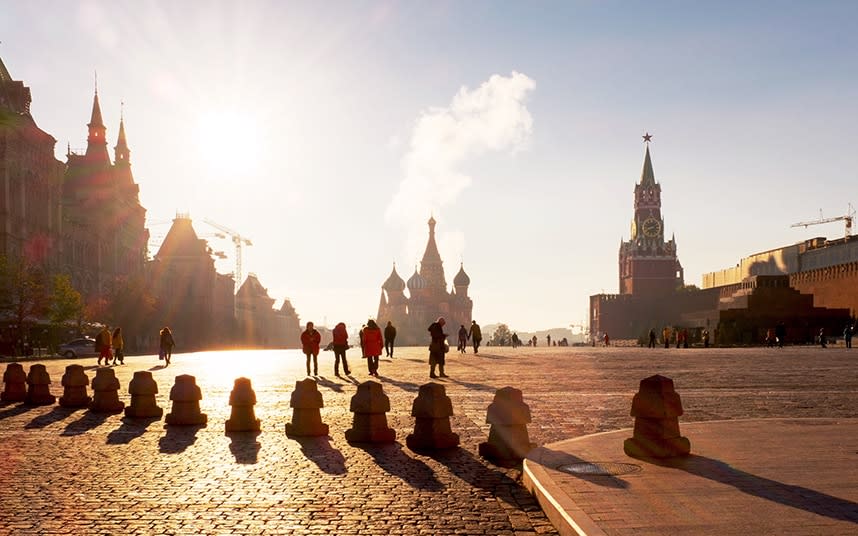
It would take Russia well over a year to welcome to its shores the same number of British visitors Spain gets in a single week.
The world’s largest country by area - nearly twice the size of its closest rival, Canada - severely underperforms when it comes to tourism. The continent-straddling nation saw just 177,000 Britons pass through its borders in 2016, according to the Foreign Office (FCO), a figure dwarfed by countries including Spain (12m visitors), Canada (724,000) and even Mexico (513,000), Vietnam (280,000) and Pakistan (270,000).
But, after a successful, incident-free World Cup, is Russia poised to enjoy a watershed moment and claim its place on the global travel map?
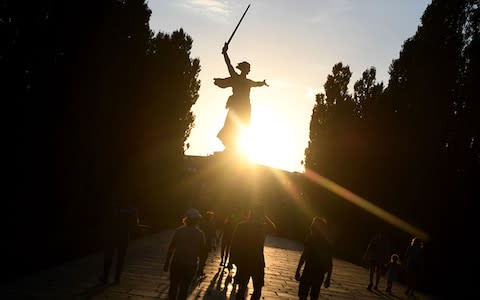
How did the World Cup help Russia's image?
Before a ball had been kicked travel analysts Euromonitor said the country would see around a million visitors during the World Cup, with “increased tourist flows over the summer expected to create a positive impact for the following years”.
Alan Rownan, sports industry manager, said the nation would see a 1.4 per cent rise in arrivals, but warned that “negative factors” such as safety concerns, burdensome visa regulations and political tension would undermine stable growth in visitor numbers.
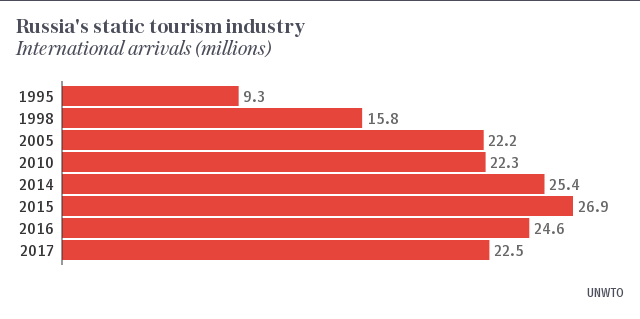
But in the absence of drama off the pitch at the tournament, and with the UK distracted from the year’s earlier geopolitical tensions, Russia seems certain to capture the interest of British travellers.
“[The World Cup] has been run so efficiently and with a singular lack of trouble that it’s been a brilliant showcase for Russia as a destination,” said Jim Molloy, sales manager at Regent Holidays, which specialises in trips to the country. The Russia pages on its website have seen visits rise by 135 per cent compared to May.
“Interest slumped earlier in the year and we had quite a few clients cancelling as a result of the diplomatic relations becoming worse in March/April [it was on March 4 that Sergei and Yulia Skripal were poisoned in Salisbury, an act blamed on Russia by the British Government], but prior to that [interest in] Russia was growing really quickly.
“The profile of the country as a destination has been raised. Even if you just take Moscow. You turned on the TV and you have Gary Lineker sat in front of St Basil’s Cathedral [on Red Square] and people see that and think that’s somewhere I haven’t been and that sows the seeds of inspiration in the long term.”
Why you should book a trip to Russia
Nick Trend, Telegraph Travel's culture editor, has been intrigued by Russia since he first visited an ice-bound Moscow on a winter city break in 1985, and has been back seven or eight times since. He writes: “That first trip was (just) pre-Gorbachev. The Soviet state had been in place for nearly 70 years, and few tourists even considered Russia as a holiday destination. Visits could only be booked through the state travel agent Intourist, the food (except the caviar) was grim, hotels were basic and guests closely monitored.
“You had to collect your room key from babushkas who watched over the lifts and corridors on each floor. And I got a taste of Russian authoritarianism - a load blast from a policeman’s whistle and a vociferous dressing down for crossing a road on a pedestrian red light.
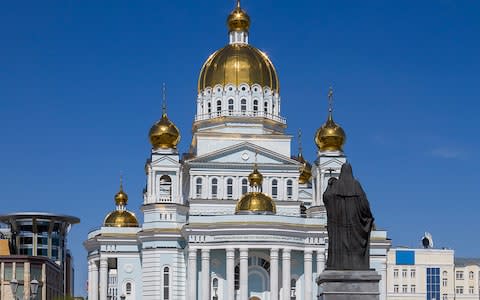
“But I was still captivated. The foreignness and alienation was tempered by a sense of familiarity. The Pushkin Museum in particular was a revelation - chocka with Matisse, Gauguin, Van Gogh, and early Picassos. And seats for the world’s greatest ballet, the Bolshoi, were a couple of pounds. It seemed bizarre to me that this country, with its long, rich history - which had helped the rest of Europe see off Napoleon, the Kaiser and Hitler, whose former royal family was closely related to ours, whose art, literature, and music is deeply entwined with our own - was perceived as so alien. Peter and the Wolf was, after all, one of the first records I was given as a child. Christmas wouldn’t be the same without the Nutcracker. Chagall made a stained glass window in Chichester cathedral, my home town.
“The reason obviously lies in the megalomania and paranoia of Stalin, a legacy which persists today. But I keep going back. I’ve crossed Siberia by train. I’ve visited Tolstoy’s house. I’ve spent literally days in Hermitage Museum in St Petersburg, and several evenings at the Mariinsky, the Bolshoi and even the Novosibirsk opera. I’ve been out to the battlefield at Borodino and had a taste of rural Russia - a world of wooden villages, dachas and neat gardens that few outsiders ever see.
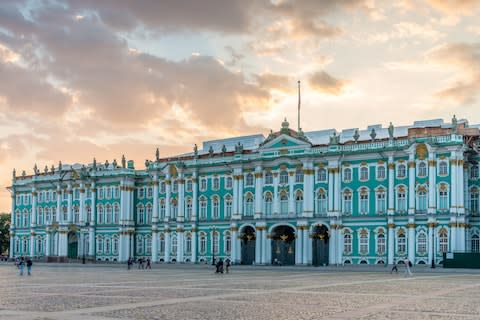
“And most of all, like the England fans, I’ve enjoyed meeting the people. Sure, those you may rub up against in Courchevel or Mayfair have given rich Russians a terrible reputation for brashness. But they are the few. The vast majority are self-effacing and long-suffering, and their sense of humour aligned with our own British instincts for self-deprecation. Certainly it takes a while to understand that smiling is not a conventional part of everyday social exchange. And that alcohol is vital to breaking down barriers. I’ve never mastered the language, but I’ve had long, affable, vodka-fuelled train journeys with chance acquaintances where little has been understood by either side, but which have ended in hugs and exchanges of gifts and addresses. Somewhere in my attic I still have letters from Nadia and Oksana, two Young Communist Party members whom I met en route to Irkutsk in the late ‘80s, and a sheath knife given to me by a man from Omsk.
“I’m not an apologist. There are serious downsides - blind intolerance of homosexuality, for example. And you may feel that the negatives outweigh potential positives. But if you haven’t been and you have any interest in history and culture, you are missing out. Now the footballers and fans are home, think about booking a trip. Not just a sightseeing excursion off a cruise ship in pretty St Petersburg, but a visit to real Russia - to Moscow and beyond.”

Will more people actually start visiting Russia?
Searches for flights soared since England after made their promising start to their campaign, but what is more interesting is that searches are up for travel beyond the World Cup. According to comparison website Skyscanner, interest in flights from today to the end of May next year are up by 76 per cent compared to the same period last year.
Moscow, the capital, and St Petersburg, Russia’s window on Europe, are the two destinations most likely to benefit from an increase in visitors - in part because they are the only two with direct flights to London - but Jim Molloy says customers are enquiring about Volgograd, Kaliningrad and Ekaterinburg, too.

“It’s a big adventure,” he says. “Because the visa process is quite painful we often encourage clients to extend their stay a bit.
“I thought the visit to Volgograd [by the England team] was handled very well by Fifa and the English FA and it came across as an impressive city.”
Images of the captivating statue, the Motherland Calls, towering above the city, alongside stories of the role of the city, formerly Stalingrad, in the outcome of the Second World War, certainly piqued interest in the media back home.
A positive experience for the England fans has also helped change the image of a nation, which in the run up to the tournament was touted as entirely hostile. The Football Supporters Federation said fans have been welcomed with “warmth and hospitality”.
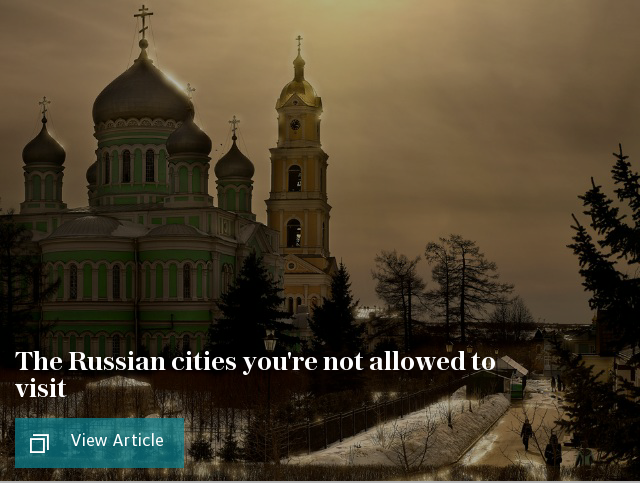
Would Russia be able to cope with an influx of tourists?
Jim Molloy says that many of the destinations, though unheard of recently by much of Britain, have tourism infrastructure in place for an existing internal market for domestic travel, though he added that the draw of places such as Siberia and Kamchatka, in the far east, is that they are off the beaten track.
A bump in visitor numbers is also high on the wishlist of the Russian Federation, with the nation keen to make a return on the 800 billion rubles (£9.6bn) spent preparing the country for the World Cup. This is particularly important in cities beyond Moscow, such as Saransk, which have also invested heavily in accommodation and transport.
It has been predicted by experts at the Moscow State University that the country should at least break even on its investment.
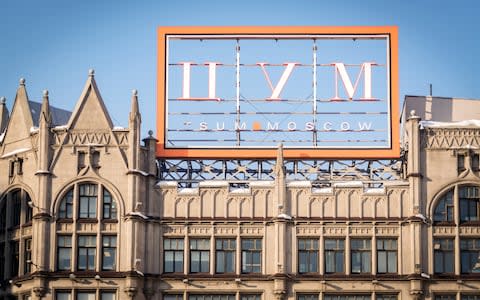
One of the targets should be the return of European visitors, who stayed away in large numbers, according to figures from the Russian Travel Union, last year. While arrivals from China, South Korea and Thailand increased, numbers from Spain, Germany, Italy and the UK fell.
The participation of many of the key markets in the World Cup will have bolstered numbers for 2018, but the long-term future is more difficult to call, not least because now that the football is over, the much-praised Fan IDs, which negated the need for visas, have been replaced by the same old tedious application process.

Moody’s rating agency warned before the tournament that a surge in tourism revenues over the course of the World Cup would only make a “short-lived” contribution to the economy and that many of the host regions would struggle to retain their tourism appeal because they are too hard to reach, too cold, and competing with more attractive destinations.
It should be noted that Brazil, a much more alluring destination on paper with its golden beaches and green heart, experienced very little visitor growth after hosting the World Cup in 2014. In fact, visitor numbers fell from 6.4 million to 6.3 million in 2015, before climbing slightly to 6.6 million in 2016, in part thanks to hosting the Olympics.
Over to you, Russia.


